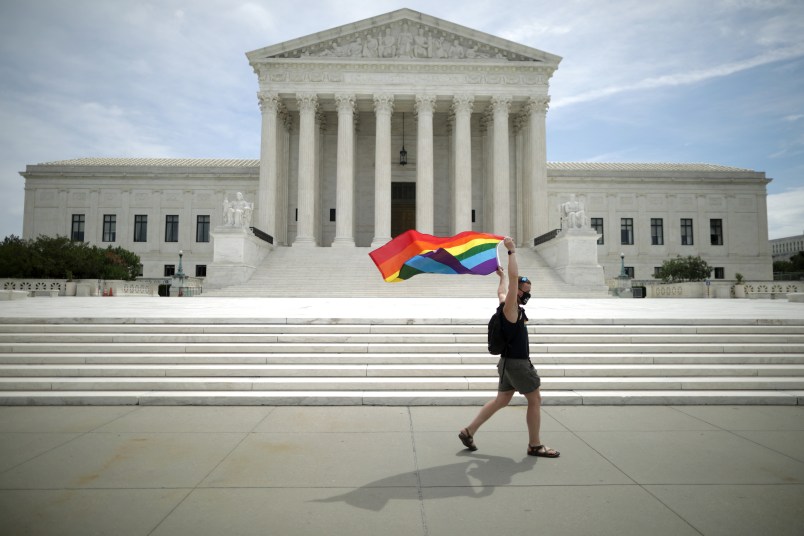The Supreme Court ruled Thursday that the city of Philadelphia’s decision to stop contracting with a Catholic foster care agency unless it placed children with same-sex couples violated the First Amendment.
The case was seen as a clue for how the new 6-3 conservative majority on the court will treat LGBTQ rights. In the end, though, the justices unanimously agreed on the final judgment that the particulars of the Philadelphia case adversely impacted religious freedom. In a sign of more to come in this arena, the justices were splintered in their rationales, with multiple concurring opinions.
Chief Justice John Roberts wrote a majority opinion that was joined by the court’s three liberals, as well as Trump-appointees Amy Coney Barrett and Brett Kavanaugh. His opinion against Philadelphia was extremely narrow, and centered around the non-discrimination language in Philadelphia’s contract with with Catholic foster care agency.
Chief Justice John Roberts’ majority opinion was joined by the court’s three liberals, as well as Trump-appointees Amy Coney Barrett and Brett Kavanaugh. The ruling against Philadelphia was extremely narrow, and centered on the non-discrimination language in Philadelphia’s contract with with the Catholic.
In a concurring opinion, Barrett and Kavanaugh signaled their openness down the road to taking a more sweeping approach in favor of religious freedom, but said the Philadelphia case was not an appropriate venue for examining those questions. (Justice Breyer concurred with the latter parts of Barrett’s opinion that explained why the current case did not warrant a reworking of the Supreme Court’s religious liberty jurisprudence.)
Justice Samuel Alito, joined by Justices Neil Gorsuch and Clarence Thomas, wrote his own concurrence to explain that he agreed with the ruling in favor of the Catholic organization. However, Alito’s rationale would have changed the standard of review in some cases alleging government infringement on religious freedom.
The lawsuit was initially brought in 2018 by Catholic Social Services, which will only vet couples who are married and heterosexual for foster care placements. It alleged that Philadelphia’s decision to stop referring it foster children violated the First Amendment’s protections for religious liberty and freedom of speech. Two foster parents joined CSS in bringing the case.
The city had used CSS for years to certify households for foster cares, but a 2018 media report on the group’s refusal to certify same-sex couples prompted a city investigation into whether CSS’ practices were discriminatory towards LGBT people.
The district court and an appeals court rejected the Catholic organization’s claims.
The case’s appeal to the Supreme Court created the possibility that the court would re-examine the legal framework it laid out 1990’s Employment Division v. Smith, which dealt with religious liberty.
Under the Supreme Court’s opinion in Smith, courts use a more lenient standard to review government policies that impact the religious expression of individuals if those policies are written in a neutral and generally applicable way. Some conservatives had hoped that the Court would use the Philadelphia case to disrupt the framework laid out in Smith — and Alito, Thomas and Gorush used their concurrence to argue that, “We should reconsider Smith without further delay.”
However Roberts’ opinion for the majority said that the Philadelphia case fell outside of Smith’s parameters. He pointed to the language in the city’s contract with the organization that said that exceptions to the city’s non-discrimination requirements could be “granted by the Commissioner or the Commissioner’s designee, in his/her sole discretion.” The possibility for those discretionary exemptions, Roberts wrote, meant that the policy was not generally applicable. Because it wasn’t not generally applicable, Philadelphia’s policy was reviewed by the court under a stricter standard than under Smith.
Barrett’s concurrence said she agreed with that assessment of the particulars of the Philadelphia case. She nonetheless expressed her sympathies towards the arguments for reconsidering Smith. (Breyer did not join that portion of her and Kavanaugh’s concurrence.) She later wrote, however, that we “need not wrestle with these questions in this case, though,” since the ruling against Philadelphia would have been the same whether Smith was precedent or not.
Her and Kavanaugh’s signal in that concurrence hinted that a case with different specifics could secure five votes on the court to weigh the law more greatly in favor of religious liberty.
Read the decision here:







Everyone agrees teh gays are getting a bit tiresome. Everyone. Go ahead. Just ask. Your Dad. He’ll tell you.
Using publlic money to discriminate against a group of persons isn’t religious freedom, it is discrimination.
You don’t get to walk down the street punching people in the face because your “religion” requires it and stopping you from doing that would be suppressing your religion.
If it’s a unanimous decision, how is it a reflection of the conservative side of the Court? Maybe the the city of Philadelphia’s decision was just plain wrong and had no legal standing. Simply because it was about an LGBTQ issue doesn’t mean that Philadelphia had the right to do it.
There’s nothing to prevent Phillie from pulling it’s contract from the Catholic org when the contract expires, so public money is only involved if they decide to continue with the contract. Residents can let their local reps know how they feel about that.
Exactly - it will be interesting when the info is published.